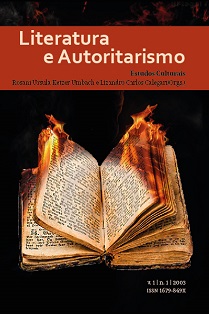Queering Latin American popular culture
DOI:
https://doi.org/10.5902/1679849X74303Keywords:
Queer, Latin america, Popular cultureAbstract
The title of this essay exploits a clear structural ambiguity in the English language, one in which the right-posed noun phrase can be interpreted to function as either the subject or the object of the left-posed present participle. Thus, they (at least) two interpretations that may be extracted from the phrase are: 1) The process whereby one queers popular culture; and 2) The process whereby popular culture produces a queering effect.
Downloads
References
CRYSTAL, David. A Dictionary of Language. 2nd ed. Chicago: U of Chicago P, 1992.
DORMAN, Ariel, and Armand Mattelart. Para leer al Pato Donald. Prólogo de Héctor Schmucler. 5a ed. Buenos Aires: Siglo XXI, 1973.
DOTY, Alexander. Flaming Classics: Queering the Film Canon. New York: Routledge, 2000.
DOTY, Alexander. Making Things Perfectly Queer; Interpreting Mass Culture. Minneapolis: U of Minnesota P, 1993.
DYER, Richard. Now You See It; Studies on Lesbian and Gay Film. New York: Routledge, 1990.
DYER, Richard. Only Entertainment. New York: Routledge, 1992.
FOSTER, David William. "The Demythification of Buenos Aires in the Argentine Novel of the Seventies." Alternative Voices in the Contemporary Latin American Narrative. Columbia: U of Missouri P, 1985. 60-106.
FOSTER, David William. "Fontanarrosa's Gauchomanía and Gauchophobia in Las aventuras de Inodoro Pereyra." From Mafalda to Los supermachos: Latin American Graphic Humor as Popular Culture. Boulder: Lynne Rienner, 1989. 37-51.
FOSTER, David William: "Mafalda: From Hearth to Plaza." Buenos Aires; Perspectives on the City and Cultural Production. Gainesville: UP of Florida, 1998. 17-33.
FOSTER, David William. "Mafalda: The Ironic Bemusement." From Mafalda to Los supermachos: Latin American Graphic Humor as Popular Culture. Boulder: Lynne Rienner, 1989. 53-63.
FOSTER, David William. Producción cultural e identidades homoeróticas; teoría y aplicaciones. San José: Editorial de la Universidad de Costa Rica, 2000.
FRANK, Lisa, and Paul Smith. Madonnarama; Essays on Sex and Popular Culture. Pittsburgh: Cleis P, 1993.
GARCÍA CANCLINI, Néstor. Transforming Modernity: Popular Culture in Mexico. Trans. by Lidia Lozano. Austin: U of Texas P, 1993.
HANSON, Ellis, ed. Out Takes; Essays on Queer Theory and Film. Durham: Duke UP, 1999.
HERNÁNDEZ, Pablo José. Para leer a Mafalda. Buenos Aires: Ediciones Meridiano, 1975.
KATZ, Jonathan. The Invention of Heterosexuality. New York: Dutton, 1995.
KINSEY Institute for Research in Sex, Gender, and Reproduction. The Art of Desire: Erotic Treasures from the Kinsey Institute... Curated by Sara Burns... Bloomington: School of Fine Arts Gallery, Indiana University, 1997.
LAVADO, Joaquín Salvador (Quino). Déjenme inventar. Buenos Aires: Ediciones de la Flor, 1983.
LAVADO, Joaquín Salvador (Quino). Humano se nace. 4. ed. Buenos Aires: Ediciones de la Flor, 1995, c1991.
LAVADO, Joaquín Salvador (Quino). Qué mala es la gente! Buenos Aires: Ediciones de la Flor, 1996.
LAVADO, Joaquín Salvador (Quino). Toda Mafalda. Buenos Aires: Ediciones de la Flor, 1993.
LAVADO, Salvador Joaquín (Quino). Yo no fui! Buenos Aires: Ediciones de la Flor, 1994.
ROBERTSON, Pamela. Guilty Pleasures; Feminist Camp from Mae West to Madonna. Durham: Duke UP, 1996.
STRAAYER, Chris, ed. Deviant Eyes, Deviant Bodies; Sexual Re-Orientations in Film and Video. New York: Columbia UP, 1996.
TRILLO, Carlos, and Guillermo Saccomanno. Historia de la historieta argentina. Buenos Aires: Ediciones Record, 1980.
WARNER, Michael. "Introduction." Fear of a Queer Planet; Queer Politics and Social Theory. Minneapolis: U of Minnesota P, 1993. vii-xxxi.
Downloads
Published
Versions
- 2023-11-24 (2)
- 2003-09-01 (1)
How to Cite
Issue
Section
License
DECLARAÇÃO DE ORIGINALIDADE E EXCLUSIVIDADE E CESSÃO DE DIREITOS AUTORAIS
Declaro que o presente artigo é original e não foi submetido à publicação em qualquer outro periódico nacional ou internacional, quer seja em parte ou na íntegra. Declaro, ainda, que após publicado pela Literatura e Autoritarismo, ele jamais será submetido a outro periódico. Também tenho ciência que a submissão dos originais à Literatura e Autoritarismo implica transferência dos direitos autorais da publicação digital. A não observância desse compromisso submeterá o infrator a sanções e penas previstas na Lei de Proteção de Direitos Autorais (nº 9610, de 19/02/98).






